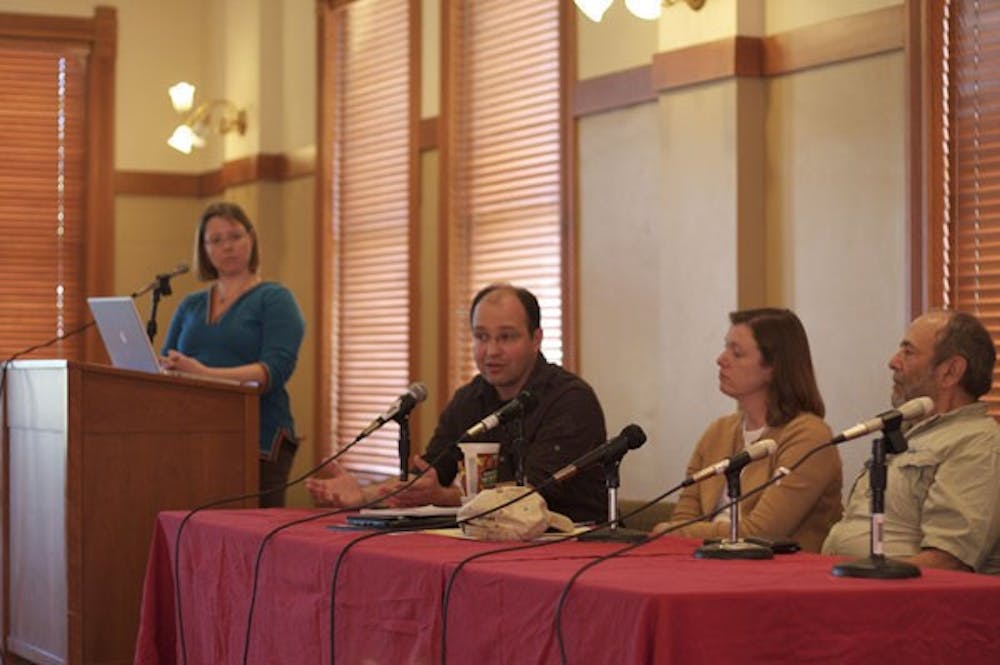From genetics and evolution to hormones, ASU graduate students had the opportunity to learn about new research and present their own at a symposium on Friday.
The Graduates in Earth, Life and Social Sciences (GELSS) Research Symposium included a poster session, podium presentations and a keynote speaker on Friday.
“The primary goal is to provide an opportunity for ASU graduate students to share their work with the ASU community and also to see what other students are doing on campus,” said Katie Alexander, a fifth-year biological sciences doctoral candidate and co-chair of GELSS.
The purpose behind the symposium is directly related to the ASU student association, GELSS. The group formed in 1999 and had its first symposium in 2000.
“It gives us a chance to kind of foster ideas about interdisciplinary research and also get to know other peers at ASU who are grad students but aren’t necessarily in your field,” said Joanna Malukiewicz, a third-year biology doctoral candidate and co-chair of GELSS.
A panel discussion with the keynote speaker Michael Arnold, a genetics professor from the University of Georgia, and five ASU faculty members was held on Thursday.
The discussion focused on genetic exchange and hybridization, the mixing of two species through genetic exchange, including producing offspring.
Malukiewicz said she studies hybridization in monkeys. Arnold’s research is related to hers, which was one factor in inviting him, she said.
“I think this gives us a really good chance to practice our talks first and get feedback from professors and our peers to help improve our talk before we go to do the real thing at professional meetings,” she said.
Arnold’s research focuses more on genetic exchange and hybridization in plants, though he has done work with animals and may continue this work in the future.
There are a number of applications to humans in the research, including crop improvement, he said. He also studies genetically modified organisms.
For example, plants can breed and create new plants. Genes from fish can also be put in strawberries so they are resistant to frost, Arnold said.
In the past, there was more of a debate about the importance of hybridization.
Some arguments from the opposition included that hybridization was rare in animals and that when it does occur, the animals don’t function as well.
However, Arnold said hybrids are common in nature and it’s not necessarily true that animals are negatively affected.
“The folks working on these kinds of issues used to be the barbarians at the gate,” he said. “Now we’re inside.”
The keynote talk focused on human evolution and its relation to genetic exchange and hybridization.
“It looks like we, too, as we developed as a species, were hybridizing occasionally at least with other species,” Arnold said.
Genetic and other types of evidence from fossil records can prove humans hybridized with other species within their genus homo, he said.
Humans interact with various organisms, and Arnold investigates if they are examples of a process of genetic exchange.
There are currently genetic exchanges impacting the human genome, like the HIV retrovirus, he said.
“When people become infected, for example, with retroviruses like HIV, it incorporates into our DNA,” Arnold said. “So, by definition, there’s a genetic exchange then between us and a virus.”
Elizabeth Engler-Chiurazzi, a third-year psychology doctoral candidate and spokeswoman for GELSS, gave a podium talk on hormone replacement therapy.
The hormone talk and other
discussions centered around the social world. Other topics included behavior, evolution and oceans.
“Women are living longer, yet the age at which menopause begins is not changing,” she said.
Women are also spending more of their lives in a post-menopausal state, and Engler-Chiurazzi is studying the cognitive effects of a hormone drug, Premarin.
“Some studies say that Premarin helps memory, and some say that it doesn’t do anything or even maybe hurts,” she said.
Though the panel discussion and keynote talk don’t deal with her research, Engler-Chiurazzi said it is beneficial to challenge herself and learn about topics that are strange to her.
“Even if it might not directly relate to my research, just learning to think about somebody else’s research and how to understand what they’re doing is going to help me be a better scientist,” she said.
Reach the reporter at reweaver@asu.edu





